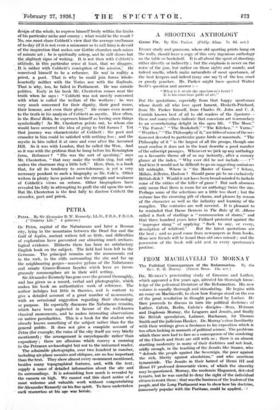PETRA
. Petra... By Sir Alexander B: W. Kennedy, LL.D., F.R.S., F.R.C.S. (" country Life." 4 guineas.) OF Petra, capital of the Nabataeans and later a Roman city, lying in the mountains between the Dead Sea and the Gulf of Aqaba, ancient writers tell us little, and difficulties of exploration have prevented our obtaining much archaeo- logical evidence. Hitherto there has been no satisfactory English book on the subject. The field had been left to the Germans. The principal remains are the monuments cut in the rock, in the cliffs surrounding the site and far up the neighbouring gorges—massive pylons of the Nabataeans and ornate Graeco-Roman façades which have an incon- gruously commonplace air in their wild setting.
Sir Alexander Kennedy has gone over the ground thoroughly, and has given us a record, verbal and photographic, which makes his book an authoritative work of reference. The author indulges but little in theories, and is content to give a detailed account of a great number of monuments, with an occasional suggestion regtrding their chronology or purpose. He especially discusses the Nabataean remains, which have been neglected in favour of the well-known classical monuments, and he makes interesting observations on native peculiarities. This is a book for the student who already knows something of the subject rather than for the general public. It does not give a complete account of Petra (for example; the ruins of the city itself arc very Welly mentioned) ; the arrangement is encyclopaedic rather" than expository ; there are allusions • which convey a meaning to the Petraean archaeologist but not to the unlearned reader.
• The admirable photographs, over two hundred in number, including air-plane mosaics and obliques, are no less important than the text. They show almost every monument mentioned, besides many topographical features, and, with the text, supply a mass of detailed information about the site and its surroundings. It is astonishing how much is revealed by the camera' on high. We cannot end this short notice of a most welcome and valuable work without congratulating Sir Alexander Kennedy on his fine spirit. To have undertaken such researches at his age was heroic.






















































 Previous page
Previous page